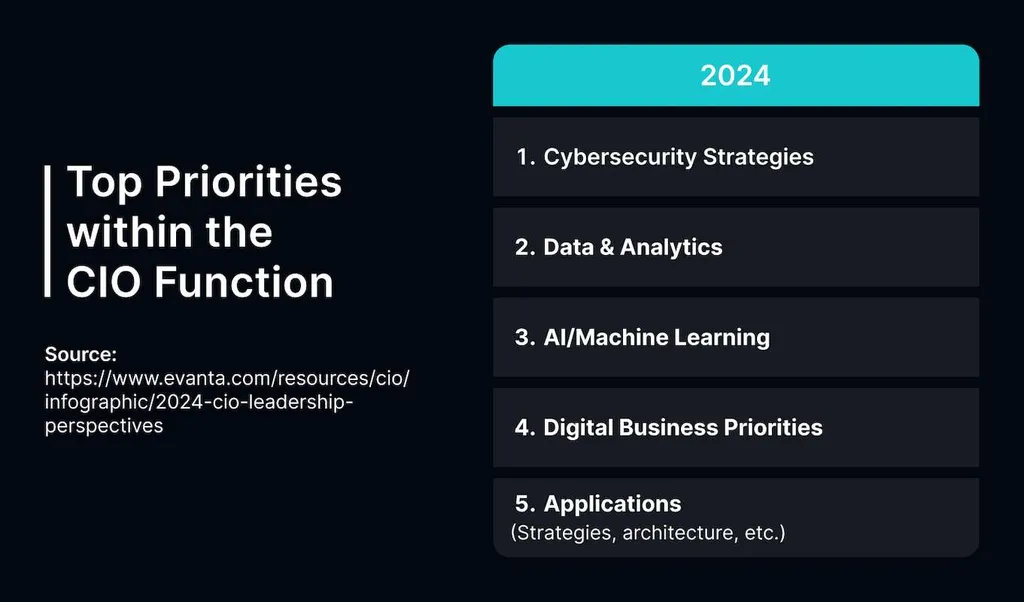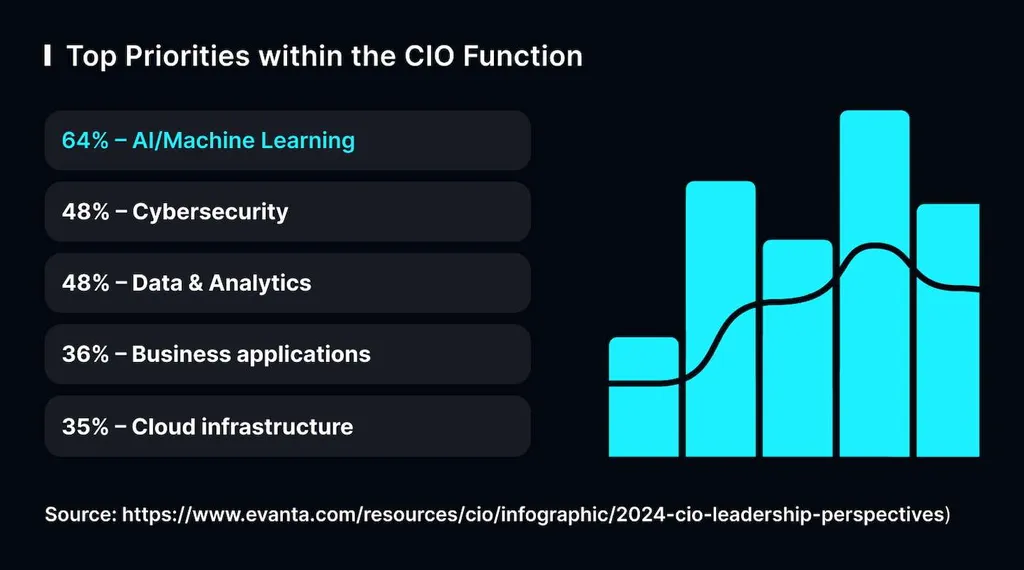The rapid expansion of artificial intelligence (AI) technology fuels discussions about the potential of algorithm-based tools. The widespread usage of AI systems across industries demonstrates the feasibility of such solutions. According to McKinsey Global Institute, the deployment of AI is expected to add up to $4.4 trillion in annual value to the world’s economy in the coming decades. In this article, we will analyze CIO perspectives on generative AI and explore how businesses leverage the power of automation to enhance customer experience (CX).
What are CIO Perspectives on Generative AI

Chief Information Officers (CIOs) must find a way to adapt to the changing environment and make AI the main focus of their business strategies. As their top priority is IT infrastructure maintenance, CIOs should learn how to integrate AI solutions with legacy systems. Goldman Sachs estimates that the deployment of algorithm-driven models will lead to a $7 trillion increase in global GDP. Two-thirds of occupations in the U.S. are expected to be impacted by AI.
Recognizing the significance of generative AI for enterprise use is necessary to get a cutting edge. Utilizing large language models (LLMs), firms can deploy advanced bots to generate replies to client queries and perform routine tasks. Training them using high-quality datasets is necessary to enhance their performance and avoid hallucinations.
Despite the ability of AI tools to interpret human language and use predictive models to formulate natural-sounding answers, large corporations are still reluctant to make such solutions an integral part of their workflows. However, the inevitable democratization of AI will lead to the usage of this technology by all teams and departments. AI bots help businesses to educate employees, engage clients, and optimize internal processes.
Adopting AI becomes the main objective as it allows CIOs to achieve the following strategic goals:
- Improve data infrastructure
- Adjust workforce structure
- Embrace innovative governance practices
MetaDialog recognizes the need to integrate custom AI systems with the existing infrastructure and builds powerful solutions capable of automating up to 87% of customer support conversations.
Benefits of Generative AI for CIOs

According to the recent MIT Technology Review Report summarizing the thoughts of 600 top-level executives, the widespread usage of AI across industries will transform global markets. CIOs emphasize the following benefits:
- Data accessibility: Generative AI and LLMs enable businesses to process large volumes of unstructured information. It lets companies access crucial insights.
- Efficient infrastructure: Tech-savvy CIOs follow innovative approaches and embrace the data lakehouse paradigm to build scalable systems. It allows executives to improve the security of the infrastructure, access budget storage options, and optimize queries for faster performance.
- Combining non-proprietary and third-party solutions: As it may be risky to rely on open-source products or use intermediary services when building LLMs, some companies strive to achieve the right balance and use the assistance of trusted providers to safeguard sensitive data. MetaDialog specializes in creating custom models that allow its clients to get an edge by increasing their team’s productivity by 5 times.
- Reduced workload: AI should not be considered as a threat, as it allows employees to make their workflows efficient and fully dedicate themselves to generating value. AI tools can be used in complex routines, enabling staff members to focus on innovative tasks.
Despite these noteworthy advantages of algorithms, CIOs call for implementing optimized governance practices. Using AI responsibly requires addressing copyright infringement issues, fostering explainability, and removing unethical content. Investing in this technology and keeping track of changes in legislation allows businesses to mitigate threats and achieve sustainability.
How CIOs Utilize AI Solutions
The widespread usage of enterprise generative AI tools demonstrates its result-yielding potential. Staying ahead of the curve requires finding new ways of reducing operating expenses and improving performance metrics. However, integrating AI systems is impossible without significant investments or getting assistance from a third-party provider.
Many CIOs triple budgets allocated to AI development as they value the capacity of such tools to analyze information and discover actionable insights. Top managers appreciate the following capabilities of AI models:
- Anticipating questions;
- Replying in real time;
- Providing context-relevant interpretations.
Even though the public focuses on the capacity of AI services to generate text and visual content, their ability to discover and synthesize information is what makes them valuable.
CIOs should invest in educational programs and hire professionals with extensive technical backgrounds to build, customize, and train AI models. Alternatively, businesses can use the services provided by MetaDialog to develop unique solutions for their budgets and specific needs.
When analyzing CIO perspectives on generative AI, it becomes noticeable that executives understand the significance of unveiling information stored in each company’s datasets. Devising a strategy, choosing KPIs to estimate the progress, and getting support from experts are the main steps on the way of integrating AI systems.
Tips and Reminders
When trying to implement AI models, CIOs face several challenges. Many executives worry that generative AI will result in the usage of shadow IT practices and compromise data security. Due to this consideration, CIOs should execute extreme caution when experimenting with third-party solutions trained on low-quality datasets.
Digital transformation requires prioritizing user data safety and deploying time-tested practices. Integrating AI powered automation systems requires teams to configure them depending on the environment where they are going to be deployed.
According to the IBM survey, 57% of companies cite insufficient data privacy as the main obstacle stopping them from deploying AI tools. 43% of businesses have doubts about transparency. Moreover, 85% of clients prefer to order services from organizations that follow strict ethical guidelines when utilizing AI.
Removing obstacles hindering the adoption requires CIOs to focus on the following goals:
- Eliminate biases;
- Improve data provenance;
- Foster AI explainability.
Building a strong corporate culture based on ethical principles is the first step toward using AI responsibly. CIOs can appoint chief officers and task them with overlooking AI adoption and ensuring legal compliance.
Bottom Line
After analyzing CIO perspectives on generative AI, it becomes clear that organizations can benefit from deploying automated tools and introducing the best data governance practices. MetaDialog understands the importance of developing AI-focused infrastructures. Our company builds powerful platforms for enterprises, helping them reduce the average response time to 20 seconds and increase customer satisfaction by 28%. Get in touch with our experts today and learn how to enhance CX by integrating advanced algorithm-based solutions.
